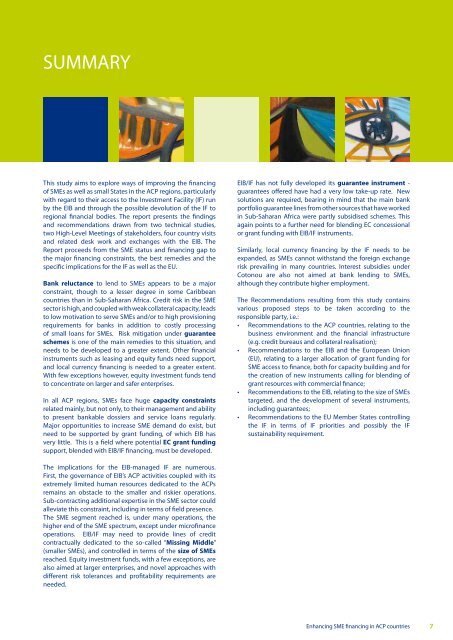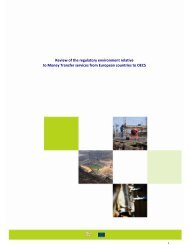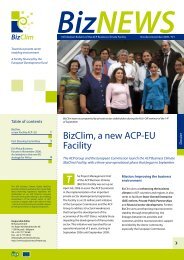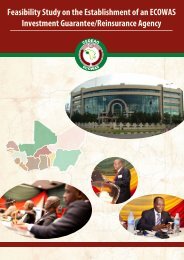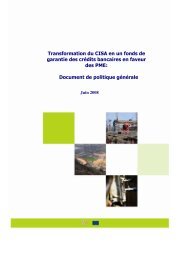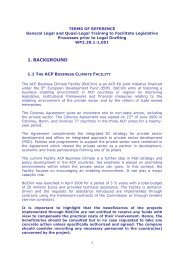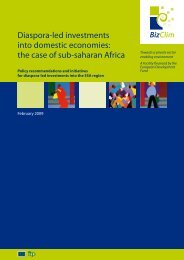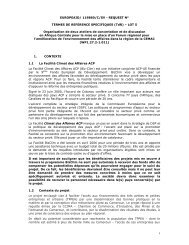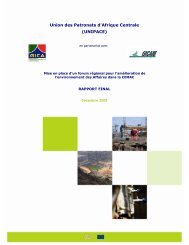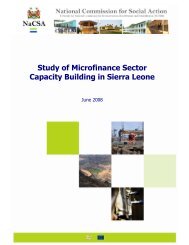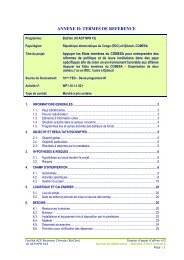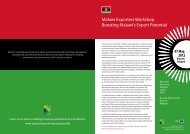Enhancing smE financing in acp countries - ACP Business Climate
Enhancing smE financing in acp countries - ACP Business Climate
Enhancing smE financing in acp countries - ACP Business Climate
Create successful ePaper yourself
Turn your PDF publications into a flip-book with our unique Google optimized e-Paper software.
SUMMARY<br />
This study aims to explore ways of improv<strong>in</strong>g the <strong>f<strong>in</strong>anc<strong>in</strong>g</strong><br />
of SMEs as well as small States <strong>in</strong> the <strong>ACP</strong> regions, particularly<br />
with regard to their access to the Investment Facility (IF) run<br />
by the EIB and through the possible devolution of the IF to<br />
regional f<strong>in</strong>ancial bodies. The report presents the f<strong>in</strong>d<strong>in</strong>gs<br />
and recommendations drawn from two technical studies,<br />
two High-Level Meet<strong>in</strong>gs of stakeholders, four country visits<br />
and related desk work and exchanges with the EIB. The<br />
Report proceeds from the SME status and <strong>f<strong>in</strong>anc<strong>in</strong>g</strong> gap to<br />
the major <strong>f<strong>in</strong>anc<strong>in</strong>g</strong> constra<strong>in</strong>ts, the best remedies and the<br />
specific implications for the IF as well as the EU.<br />
Bank reluctance to lend to SMEs appears to be a major<br />
constra<strong>in</strong>t, though to a lesser degree <strong>in</strong> some Caribbean<br />
<strong>countries</strong> than <strong>in</strong> Sub-Saharan Africa. Credit risk <strong>in</strong> the SME<br />
sector is high, and coupled with weak collateral capacity, leads<br />
to low motivation to serve SMEs and/or to high provision<strong>in</strong>g<br />
requirements for banks <strong>in</strong> addition to costly process<strong>in</strong>g<br />
of small loans for SMEs. Risk mitigation under guarantee<br />
schemes is one of the ma<strong>in</strong> remedies to this situation, and<br />
needs to be developed to a greater extent. Other f<strong>in</strong>ancial<br />
<strong>in</strong>struments such as leas<strong>in</strong>g and equity funds need support,<br />
and local currency <strong>f<strong>in</strong>anc<strong>in</strong>g</strong> is needed to a greater extent.<br />
With few exceptions however, equity <strong>in</strong>vestment funds tend<br />
to concentrate on larger and safer enterprises.<br />
In all <strong>ACP</strong> regions, SMEs face huge capacity constra<strong>in</strong>ts<br />
related ma<strong>in</strong>ly, but not only, to their management and ability<br />
to present bankable dossiers and service loans regularly.<br />
Major opportunities to <strong>in</strong>crease SME demand do exist, but<br />
need to be supported by grant fund<strong>in</strong>g, of which EIB has<br />
very little. This is a field where potential EC grant fund<strong>in</strong>g<br />
support, blended with EIB/IF <strong>f<strong>in</strong>anc<strong>in</strong>g</strong>, must be developed.<br />
EIB/IF has not fully developed its guarantee <strong>in</strong>strument -<br />
guarantees offered have had a very low take-up rate. New<br />
solutions are required, bear<strong>in</strong>g <strong>in</strong> m<strong>in</strong>d that the ma<strong>in</strong> bank<br />
portfolio guarantee l<strong>in</strong>es from other sources that have worked<br />
<strong>in</strong> Sub-Saharan Africa were partly subsidised schemes. This<br />
aga<strong>in</strong> po<strong>in</strong>ts to a further need for blend<strong>in</strong>g EC concessional<br />
or grant fund<strong>in</strong>g with EIB/IF <strong>in</strong>struments.<br />
Similarly, local currency <strong>f<strong>in</strong>anc<strong>in</strong>g</strong> by the IF needs to be<br />
expanded, as SMEs cannot withstand the foreign exchange<br />
risk prevail<strong>in</strong>g <strong>in</strong> many <strong>countries</strong>. Interest subsidies under<br />
Cotonou are also not aimed at bank lend<strong>in</strong>g to SMEs,<br />
although they contribute higher employment.<br />
The Recommendations result<strong>in</strong>g from this study conta<strong>in</strong>s<br />
various proposed steps to be taken accord<strong>in</strong>g to the<br />
responsible party, i.e.:<br />
• Recommendations to the <strong>ACP</strong> <strong>countries</strong>, relat<strong>in</strong>g to the<br />
bus<strong>in</strong>ess environment and the f<strong>in</strong>ancial <strong>in</strong>frastructure<br />
(e.g. credit bureaus and collateral realisation);<br />
• Recommendations to the EIB and the European Union<br />
(EU), relat<strong>in</strong>g to a larger allocation of grant fund<strong>in</strong>g for<br />
SME access to f<strong>in</strong>ance, both for capacity build<strong>in</strong>g and for<br />
the creation of new <strong>in</strong>struments call<strong>in</strong>g for blend<strong>in</strong>g of<br />
grant resources with commercial f<strong>in</strong>ance;<br />
• Recommendations to the EIB, relat<strong>in</strong>g to the size of SMEs<br />
targeted, and the development of several <strong>in</strong>struments,<br />
<strong>in</strong>clud<strong>in</strong>g guarantees;<br />
• Recommendations to the EU Member States controll<strong>in</strong>g<br />
the IF <strong>in</strong> terms of IF priorities and possibly the IF<br />
susta<strong>in</strong>ability requirement.<br />
The implications for the EIB-managed IF are numerous.<br />
First, the governance of EIB’s <strong>ACP</strong> activities coupled with its<br />
extremely limited human resources dedicated to the <strong>ACP</strong>s<br />
rema<strong>in</strong>s an obstacle to the smaller and riskier operations.<br />
Sub-contract<strong>in</strong>g additional expertise <strong>in</strong> the SME sector could<br />
alleviate this constra<strong>in</strong>t, <strong>in</strong>clud<strong>in</strong>g <strong>in</strong> terms of field presence.<br />
The SME segment reached is, under many operations, the<br />
higher end of the SME spectrum, except under microf<strong>in</strong>ance<br />
operations. EIB/IF may need to provide l<strong>in</strong>es of credit<br />
contractually dedicated to the so-called “Miss<strong>in</strong>g Middle”<br />
(smaller SMEs), and controlled <strong>in</strong> terms of the size of SMEs<br />
reached. Equity <strong>in</strong>vestment funds, with a few exceptions, are<br />
also aimed at larger enterprises, and novel approaches with<br />
different risk tolerances and profitability requirements are<br />
needed.<br />
<strong>Enhanc<strong>in</strong>g</strong> SME <strong>f<strong>in</strong>anc<strong>in</strong>g</strong> <strong>in</strong> <strong>ACP</strong> <strong>countries</strong><br />
7


